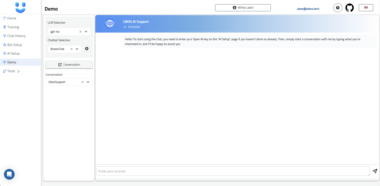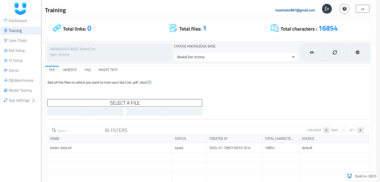UBOS Asset Marketplace: Unleashing the Power of AI Agents with the EVM MCP Server
In the rapidly evolving landscape of artificial intelligence, the ability for AI agents to seamlessly interact with real-world data and systems is paramount. The UBOS platform understands this need and provides a full-stack AI Agent development environment designed to empower businesses across all departments. A crucial component in achieving this is the EVM MCP Server, now available on the UBOS Asset Marketplace.
The Model Context Protocol (MCP) standardizes how applications provide context to Large Language Models (LLMs). An MCP server acts as a vital bridge, enabling AI models to access and interact with external data sources and tools. The EVM MCP Server specifically focuses on providing blockchain services, allowing AI agents to interact with a multitude of Ethereum Virtual Machine (EVM)-compatible networks through a unified and consistent interface.
What is the EVM MCP Server?
The EVM MCP Server is a comprehensive tool designed to provide blockchain services to AI agents across numerous EVM-compatible networks. It supports over 30 networks, including major players like Ethereum, Optimism, Arbitrum, Base, Polygon, and many others. This server allows AI agents to:
- Read blockchain state (balances, transactions, blocks)
- Interact with smart contracts
- Transfer tokens (native, ERC20, ERC721, ERC1155)
- Query token metadata and balances
- Utilize chain-specific services
- Leverage ENS name resolution for all address parameters (using human-readable names like ‘vitalik.eth’ instead of addresses)
All these services are exposed through a consistent interface of MCP tools and resources, streamlining the process for AI agents to discover and utilize blockchain functionality. A key feature is that every tool that accepts Ethereum addresses also supports ENS names, automatically resolving them in the background. This dramatically simplifies interaction with blockchain data for AI agents.
Key Features of the EVM MCP Server
- Multi-Chain Support: The server supports over 30 EVM-compatible networks, allowing AI agents to interact with a wide range of blockchain ecosystems.
- Blockchain Data Access: Provides access to essential blockchain data such as chain information, block data, transaction details, and address balances.
- Token Services: Comprehensive support for ERC20, ERC721 (NFTs), and ERC1155 tokens, including metadata retrieval, balance checks, transfers, and approval of spending allowances.
- Smart Contract Interactions: Enables AI agents to read contract state through view/pure functions, write services with private key signing, verify contracts, and retrieve/filter event logs.
- Comprehensive Transaction Support: Facilitates native token transfers, gas estimation, transaction status tracking, and detailed error handling.
- ENS Resolution: Simplifies interactions by allowing the use of human-readable Ethereum addresses (ENS names) instead of complex hexadecimal addresses.
Use Cases: Empowering AI Agents with Blockchain Access
The EVM MCP Server unlocks a plethora of use cases for AI agents, enabling them to participate in the decentralized world in meaningful ways. Here are some examples:
- Decentralized Finance (DeFi) Automation: AI agents can monitor DeFi protocols, execute trades, manage portfolios, and optimize yield farming strategies. The server provides the necessary tools to interact with decentralized exchanges (DEXs), lending platforms, and other DeFi applications.
- NFT Management: AI agents can manage NFT collections, track ownership, buy/sell NFTs, and even create personalized NFT experiences. The server’s NFT support allows agents to interact with NFT marketplaces and utilize NFTs in various applications.
- Supply Chain Tracking: AI agents can track goods and materials as they move through a supply chain, ensuring transparency and accountability. By leveraging blockchain’s immutable ledger, agents can verify product authenticity and provenance.
- Identity Verification: AI agents can verify identities using blockchain-based identity solutions. The server allows agents to access and validate identity data stored on the blockchain, improving security and reducing fraud.
- Data Provenance: AI agents can track the origin and history of data, ensuring its integrity and reliability. By recording data provenance on the blockchain, agents can verify the source and modifications of data, building trust in AI-driven insights.
- Automated Governance: AI agents can participate in decentralized governance processes, voting on proposals and influencing the direction of blockchain projects. The server provides the tools for agents to interact with governance contracts and participate in on-chain voting.
Integrating the EVM MCP Server with UBOS
The UBOS platform simplifies the integration of the EVM MCP Server into your AI agent workflows. UBOS provides a visual interface for orchestrating AI agents, connecting them to various data sources, and building custom agents with your own LLM models. Here’s how the EVM MCP Server complements the UBOS ecosystem:
- Seamless Integration: The UBOS Asset Marketplace allows you to easily deploy and manage the EVM MCP Server within your UBOS environment.
- Visual Orchestration: Use the UBOS visual editor to connect your AI agents to the EVM MCP Server, enabling them to access blockchain data and interact with smart contracts.
- Custom Agent Development: Build custom AI agents that leverage the EVM MCP Server to perform specific blockchain-related tasks.
- Multi-Agent Systems: Create complex multi-agent systems where agents collaborate to achieve goals, with some agents specializing in blockchain interactions through the EVM MCP Server.
Supported Networks: A Comprehensive List
The EVM MCP Server boasts extensive network support, catering to a wide range of blockchain needs. Here’s a detailed breakdown of the supported networks:
Mainnets:
- Ethereum (ETH)
- Optimism (OP)
- Arbitrum (ARB)
- Arbitrum Nova
- Base
- Polygon (MATIC)
- Polygon zkEVM
- Avalanche (AVAX)
- Binance Smart Chain (BSC)
- zkSync Era
- Linea
- Celo
- Gnosis (xDai)
- Fantom (FTM)
- Filecoin (FIL)
- Moonbeam
- Moonriver
- Cronos
- Scroll
- Mantle
- Manta
- Blast
- Fraxtal
- Mode
- Metis
- Kroma
- Zora
- Aurora
- Canto
Testnets:
- Sepolia
- Optimism Sepolia
- Arbitrum Sepolia
- Base Sepolia
- Polygon Amoy
- Avalanche Fuji
- BSC Testnet
- zkSync Sepolia
- Linea Sepolia
- Scroll Sepolia
- Mantle Sepolia
- Manta Sepolia
- Blast Sepolia
- Fraxtal Testnet
- Mode Testnet
- Metis Sepolia
- Kroma Sepolia
- Zora Sepolia
- Celo Alfajores
- Goerli
- Holesky
This broad network coverage ensures that your AI agents can interact with the blockchain ecosystems most relevant to your business needs.
Getting Started with the EVM MCP Server
To begin using the EVM MCP Server, you’ll need to meet the following prerequisites:
- Bun: 1.0.0 or higher
- Node.js: 18.0.0 or higher (if not using Bun)
Installation is straightforward:
bash
Clone the repository
git clone https://github.com/yourusername/mcp-evm-server.git cd mcp-evm-server
Install dependencies with Bun
bun install
Or with npm
npm install
After installation, you can configure the server by modifying the src/core/chains.ts file for chain configuration and src/server/http-server.ts for server configuration.
You can run the server using npx, bun, or npm. Refer to the original documentation for detailed instructions on running the server in different modes (stdio or HTTP).
Integrating with Cursor and Claude CLI
The EVM MCP Server seamlessly integrates with popular development tools like Cursor and Claude CLI, further enhancing the developer experience.
Cursor:
You can connect to the MCP server from Cursor by adding a new MCP server in Cursor’s settings, specifying the command to run the server. Alternatively, you can create an .cursor/mcp.json file for a more portable and shareable configuration.
Claude CLI:
Connecting with Claude CLI is even simpler, requiring just two commands:
bash
Add the MCP server
claude mcp add evm-mcp-server npx @mcpdotdirect/evm-mcp-server
Start Claude with the MCP server enabled
claude
API Reference: Tools and Resources
The EVM MCP Server provides a comprehensive API for interacting with blockchain data and services. The API consists of two main components: Tools and Resources.
Tools:
Tools are functions that perform specific actions, such as retrieving token balances, transferring tokens, or reading smart contract state. All tools that accept address parameters support both Ethereum addresses and ENS names.
Resources:
Resources are URIs that expose blockchain data, such as chain information, block data, transaction details, and token information. All resource URIs that accept addresses also support ENS names.
Refer to the original documentation for a detailed list of available tools and resources, along with their parameters and descriptions.
Security Considerations
Security is paramount when dealing with blockchain interactions. The EVM MCP Server incorporates several security measures:
- Private Key Handling: Private keys are used only for transaction signing and are never stored by the server.
- Authentication: Consider implementing additional authentication mechanisms for production use.
- HTTPS: Use HTTPS for the HTTP server in production environments.
- Rate Limiting: Implement rate limiting to prevent abuse.
- Confirmation Steps: For high-value services, consider adding confirmation steps.
Conclusion: Empowering AI Agents with Blockchain Connectivity
The EVM MCP Server, available on the UBOS Asset Marketplace, provides a crucial link between AI agents and the world of blockchain. By offering a unified and consistent interface to interact with numerous EVM-compatible networks, the server empowers AI agents to participate in DeFi, manage NFTs, track supply chains, verify identities, and much more. Integrate the EVM MCP Server with the UBOS platform to unlock the full potential of AI agents in the decentralized world.
EVM Server
Project Details
- chulanpro5/evm-mcp-server
- @mcpdotdirect/evm-mcp-server
- MIT License
- Last Updated: 3/20/2025
Recomended MCP Servers
learn to make some mcp servers
Allow LLMs to control a browser with Browserbase and Stagehand

An advanced web browsing server for the Model Context Protocol (MCP) powered by Playwright, enabling headless browser interactions...

An MCP server that provides access to Swagger/OpenAPI documentation and allows making API requests based on the specification.

An MCP server application that sends various types of messages to the WeCom group robot.
Collection of Canvas LMS and Gradescope tools for the ultimate EdTech model context protocol. Allows you to query...
MCP server for searching npm packages

An MCP server that uses AppleScript to send iMessages and manage contacts.
This read-only MCP Server allows you to connect to Dynamics 365 Business Central data from Claude Desktop through...
Powerful Model Context Protocol (MCP) implementation for visualizing directory structures with real-time updates, configurable depth, and smart exclusions...
 From vibe coding to vibe deployment. UBOS MCP turns ideas into infra with one message.
From vibe coding to vibe deployment. UBOS MCP turns ideas into infra with one message.





